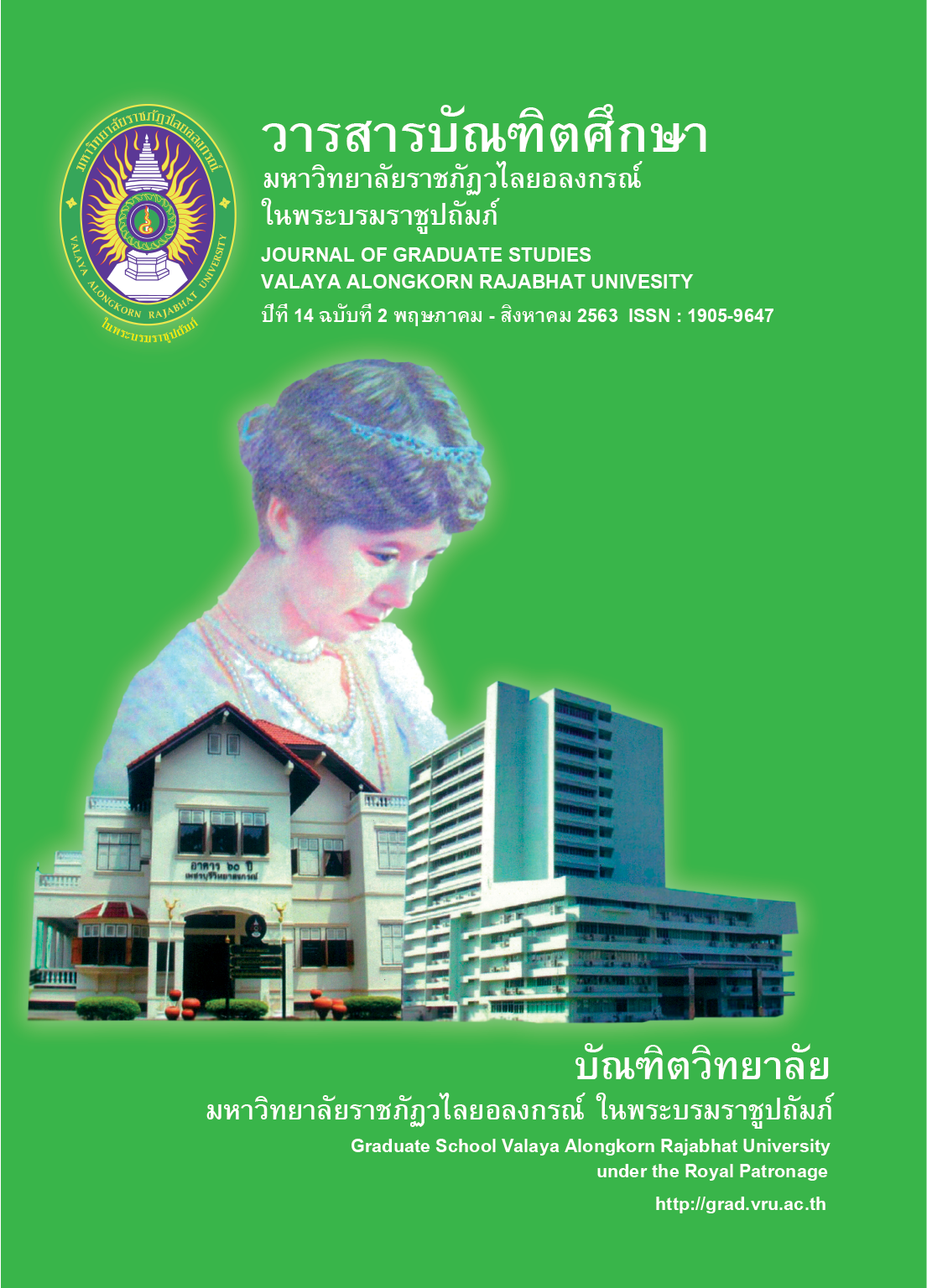THE GUIDELINES FOR MANAGING THE ACCOUNTING SYSTEM AND PREPARATION OF FINANCIAL REPORTS FOR TEMPLE TO BECOM SUSTAINABILITY
Main Article Content
Abstract
This research aims to study the guidelines for managing the accounting system and the preparation of financial reports in accordance with accounting standards for temples. A qualitative research model was conducted using in-depth interview to collect data form 16 example temples representative that have been selected from the Sangha Supreme Council of Thailand Resolution 592/2560 and 90/2561 in Bangkok and Nakhon Pathom Province and 10 experts focus group discussions to confirm the research results and exchange ideas that more helpful for this research.
The result indicated that the guidelines for managing accounting systems and well preparing financial reports for temple are 1) Additional training knowledge to accountants or involves. 2) Clearly define the accounting procedures that easy to understand and not complicated. 3) Monthly and annual meetings to discuss and exchange experiences to solve problems, follow up and evaluation. 4) Use the same standard format of documents related to accounting. 5) Check and certify the accounting preparation thoroughly before making a report. 6) Adhere to accounting principles with transparency and accuracy according to objectives. 7) Keeping documents related to accounting preparation correctly and completely and can be verified at any time. 8) Clearly create the flow of accounting documents. 9) Clearly of duties of accounting for those involved. 10) There should be segmentation according to the context and potential of accounting. 11) Create a suitable accounting system program for temple. 12) Increase the number of example temples. 13) There must be a document maker, inspector and author in the process of disbursement every time to counterbalance and transparency. 14) There should be a learning center to provide information and advice about accounting report preparation. 15) Clearly define the same period of financial report preparation for every temple and 16) Use a successful temple to act as a mentor to consult for the new temple.
Article Details

This work is licensed under a Creative Commons Attribution-NonCommercial-NoDerivatives 4.0 International License.
บทความทุกเรื่องได้รับการตรวจความถูกต้องทางวิชาการโดยผู้ทรงคุณวุฒิ ทรรศนะและข้อคิดเห็นในบทความ Journal of Global of Perspectives in Humanities and Social Sciences (J-GPHSS) มิใช่เป็นทรรศนะและความคิดของผู้จัดทำจึงมิใช่ความรับผิดชอบของบัณฑิตวิทยาลัย มหาวิทยาลัยราชภัฏวไลยอลงกรณ์ ในพระบรมราชูปถัมภ์ กองบรรณาธิการไม่สงวนสิทธิ์การคัดลอก แต่ให้อ้างอิงแหล่งที่มา
References
Arinjai, K. (2010). panhā dān kānčhat tham banchī læ kān khūapkhum phāinai khō̜ng klum ʻō̜m sap phư̄a kānphalit nai ʻamphœ̄ phān čhangwat chīang rāi [Problems of accounting and internal control of Production savings groups in Phan District Chiang Rai province]. Independent Study Report, Master of Accounting, Chiang Mai University.
Budget Bureau of the Prime Minister. (2018). ngoppramān rāičhāi pračham pīngoppramān Phō̜.Sō̜. lem thī [Budget for the fiscal year 2019, Volume 12]. Bangkok: Bureau of the Budget of the Prime Minister.
Department of Business Development. (2014). prakāt khō̜ng krommakān phatthanā thurakit : kānkamnot khunnasombat læ ngư̄ankhai kān pen nak banchī sō̜ngphanhārō̜ihāsipčhet [Announcement of the Department of Business Development: Determination of Qualifications and Conditions of Being an Accountant, 2014]. Bangkok: Department of Business Development.
Junsom, N. (2012). kānbō̜rihān kānngœ̄n khō̜ngwat nai prathēt Thai. khrōngkān sưksā kānbō̜rihān kānngœ̄n khō̜ngwat nai prathēt Thai raya thī sō̜ng [Financial management of temples in Thailand. Study of financial management of temples in Thailand, Phase II]. Bangkok: Faculty of Economic Development, National Institute of Development Administration.
Junsonthima, K. (2014). kānbō̜rihān čhatkān sātsanasombat khō̜ng wat nai phra phut sātsanā: sưksā chapho̜ kō̜ranī ngœ̄n bō̜ričhāk [Religious property management of Buddhist temples: a case study of donations]. Master of Laws thesis, Graduate School, National Institute of Development Administration.
National Buddhism Office. (2017). banchī rāi chư̄ wat thūa prathēt pī sō̜ngphanhārō̜ihoksip [List of temples nationwide 2017]. Retrieved from https://www.onab.go.th.
Phichetkul, N. (2012). kān rāingān læ kān wikhro̜ ngop kānngœ̄n [Reporting and analysis of financial statements]. Bangkok: TPN Press.
Phuvapriyathorn, C. (2010). patčhai thī song phon tō̜ khwāmsamret nai kānčhat tham banchī læ ngop kānngœ̄n khō̜ngkō̜ng thun mūbān læ chumchon mư̄ang nai mummō̜ng khō̜ng phū phān kān ʻoprom phū trūat sō̜p banchī kō̜ngthun mūbān læ chumchon mư̄ang [Factors that affect the success of accounting and financial statements of village and community funds in the view of those who have trained the auditors of the village and community funds]. Independent study of Master of Accounting Thesis in Accounting, Faculty of Faculty of Commerce and Accountancy, Thammasat University.
Pramahasunan, S. (2014). kānphatthanā rūpbǣp kānčhatkān sātsanasombat khō̜ng wat nai čhangwat Phra Nakhō̜n Sī ʻAyutthayā [The development of the religious property management model of temples in Phra Nakhon Si Ayutthaya Province]. Doctor of Education Program in Education Buddhist Management, Graduate School, Mahachulalongkornrajavidyalai University.
Phamahathawee, P. (2016). kānbō̜rihān kānngœ̄n khō̜ngwat tām lak thammāphibān sưksā kō̜ranī wat nai khēt ʻamphœ̄ mư̄ang čhangwat nonthaburī [Financial management of temples according to good governance principles. Case study in the Muang district, Nonthaburi]. Journal of Research and Development, Loei Rajabhat University, 11(37), 11-22.
Pramuansuk, N. (2008). banchī bư̄angton nưng [Basic account 1]. Bangkok: Chitwat.
Religious Affairs Department. (2016). phǣnkān ʻuppatham khumkhrō̜ng sātsanā tāng tāng phāitai khamsang hūanā khana raksā khwām sangop hǣng chāt thī sīsipkāo/sō̜ngphanhārō̜ihāsipkāo (pīngoppramān sō̜ngphanhārō̜ihoksip - sō̜ngphanhārō̜ihoksi) [A plan to support religious protection under the order of the head of the National Council for Peace and Order (NCPO), 49/2016 (Fiscal year 2017-2564)]. Bangkok: Department of Religious Affairs Ministry of Culture.
Secretariat of the Sangha Association. (2017). phrarātchabanyat khana song (chabap thī sām) Phō̜.Sō̜. sō̜ngphanhārō̜ihoksip [Sangha Act (No. 3) BE 2560]. Bangkok: Office of Buddhism.
Songmuang, D. (2018). kānʻō̜kbǣp rabop banchī [Accounting system design]. Bangkok: Sematham.
Sriwithoon, C. (2018). khwāmrū bư̄angton kīeokap kān banchī [Introduction to accounting]. Retrieved from https://www.chumphon2.mju.ac.th/E- learning/ Elearning/E-learning/E-Learning_c/chapter/chapter1.htm.
Supphawatthanakul, K. (2014). pluk krasǣ sāng rākhā phrakhrư̄ang mai bon sēnthāng thurakit satthā mūnlakhā sī mư̄nlān [Wake up to create a new Buddha amulet price on the business path of faith worth 4 billion]. Retrieved from https://tcijthai.com.
Wongruang, H. (2015). khwāmsāmāt khō̜ng phūčhattham banchī kō̜ngthun mūbān læ chumchon mư̄ang kō̜ranī sưksā tambon bān yāng ʻamphœ̄ wat bōt čhangwat phitsanulōk [Ability of accountants, village funds and urban communities in case of Ban Yang Subdistrict, Wat Bot District Phitsanulok Province]. Independent Study in Master of Accounting, Accounting Department, Graduate School, University of Phitsanulok.


